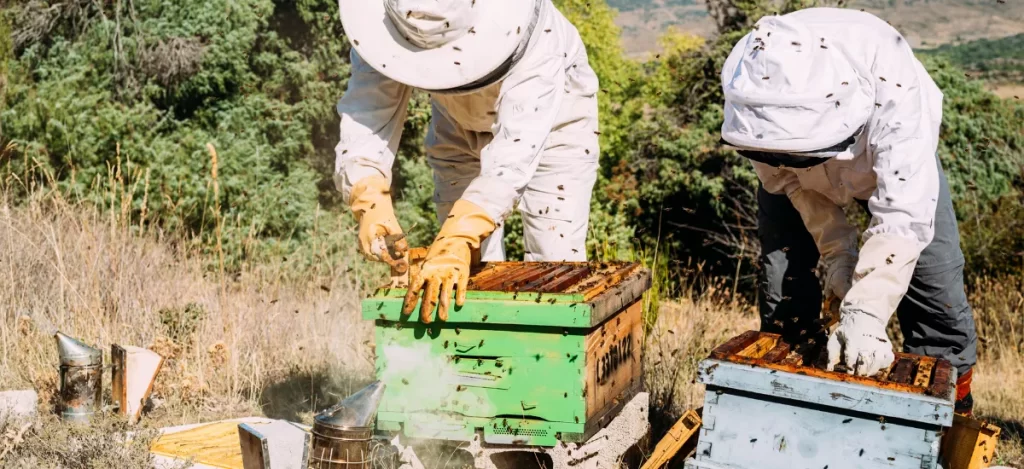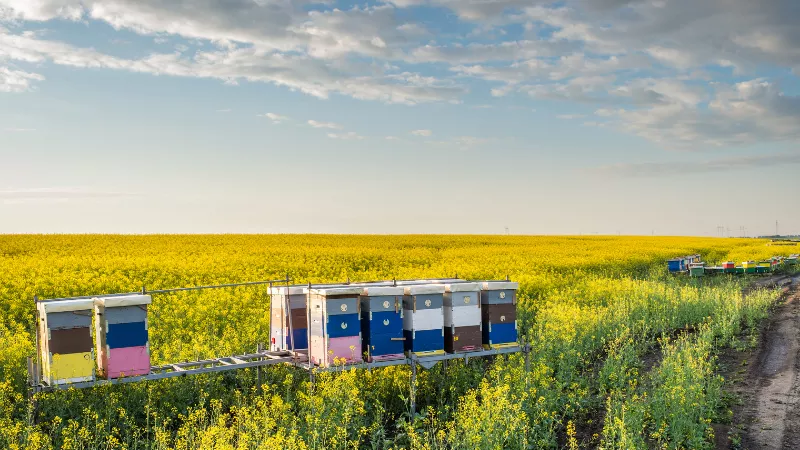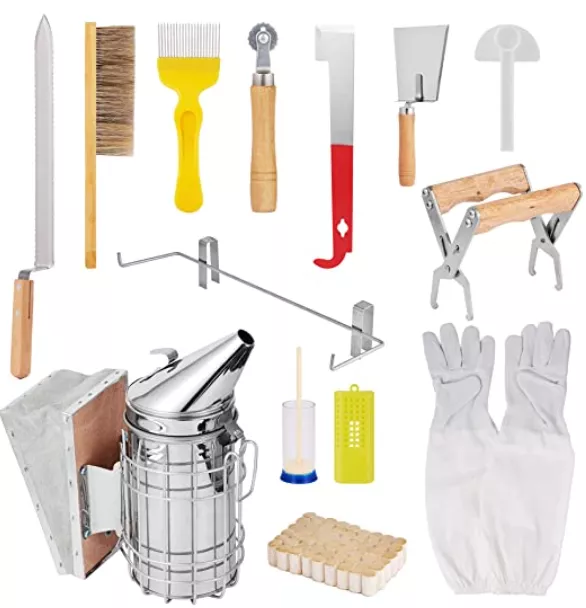Beekeeping is one of the noblest branches of agriculture. Although we have heard from many beekeepers in recent years that the seasons are bad for beekeepers, we should be optimistic if we are considering beekeeping.
Not so long ago, a beekeeper could put bees in a hive and expect the bees to simply collect honey without much dedication to them. Those “good old days” are behind us, and successful beekeepers continue to study bees and learn new beekeeping techniques to help their bees stay healthy and productive despite the various changes happening around us.
Unfortunately, the rapid changes of the seasons caused by climate change, warm winters, late frosts in spring that destroy the bloom in development, heavy rain or drought are extremely unfavorable conditions for bees and which we cannot really influence.

Many people find that working with bees is easy. It is true that beekeeping is a demanding job, and it is expensive to begin with. Beekeeping requires a daily presence in the apiary. Not when you can and want to, but when the bee asks.
If we dedicate ourselves enough, we can make a good living from the production of honey and other honey products.
If you are interested in beekeeping for beginners, and if you want to be dedicated to beekeeping, keep in mind that this noble craft is not recommended for everyone. Find out in the following lines whether you have anything other than the love and will that bees need for a novice beekeeper.
Beekeepers’ Associations, Seminars, Books And Other Education
Interest in beekeeping is growing day by day. Beekeeping has become interesting as an additional income for many because it does not require much space and bee communities are not only useful to the beekeeper but to the whole area because they increase the yield of other farmers in the area.
In many countries of the world, beekeeper is a welcome neighbor or guest.
Although it seems easy to start beekeeping, this does not mean that it will be easy to work and solve problems in the apiary that every beekeeper encounters, not just a novice beekeeper.
Problems that accompany the bee community, doubts about health, choice of queen, swarming and the like require from beekeepers more than dedication, resourcefulness and knowledge.
So, before you start choosing a place for the apiary, purchasing equipment, purchasing the first bees, it is necessary to set aside time for education. My advice is to take enough time and not rush.
Get reliable literature, whenever you have the opportunity to watch shows about beekeeping, documentaries, become a member of the nearest beekeepers’ association and go through various lectures and gatherings, professional trips, events and beekeeping schools.
Through socializing, you will meet beekeepers of different ages and acquire new knowledge and various experiences that you will surely be able to apply later in your apiary.
Am I A Beekeeper?
It is very important to firstly get acquainted with the obligations of a beekeeper and see what his/her life is like. In this way, we will easily determine whether we are at all eligible to be beekeepers.
Although beekeeping is a beautiful and noble job that involves a lot of time spent in nature, it brings with it the need to plan for the long haul. Beekeeping also brings with it activities that need to be harmonized with the temperature, time of year, etc.
Staying In Nature
Staying with bees is most intense during warm and mostly sunny days. There are no activities in the apiary during the winter, but that does not mean that beekeepers get bored during the winter.
Thinking A Few Steps Ahead
In order to easily master the bee society and beekeeping in general, you need to have pre-designed strategies and activities. The consequences of some beekeeper’s moves may not be seen immediately, or after two days, but they have long-term consequences for the bee society. You know, bad decisions are harder to fix later on.
Be Good At Working With Wood
You don’t have to be a professional carpenter. But it is very desirable that you know how to do small carpentry work. One beekeeper should be able to repair, finish, tighten the hive, and even paint it so as not to endanger the swarm.
Caring For Nature, Pollution, Healthy Nutrition
Bees as part of the ecosystem suffer the consequences of irresponsible treatment of the environment. Almost every beekeeper is a true lover of nature and strives to protect and preserve it.
How To Choose A Place For An Apiary?

Having the desire and will to engage in beekeeping is a big plus, but it is necessary that certain conditions are met.
Probably the most important of all the conditions on the road to successful beekeeping is choosing a quality and adequate place where it is safe to raise an apiary.
First of all, the place for the apiary should meet the following conditions:
There Must Be Enough Food Around The Beehives
We must keep in mind that the apiary is located in the most favorable location for the bee community. The apiary should be in an area that has enough bee grazing (nectar and pollen). That means a lot more meadows with spring flowers, fruit trees, maybe an acacia forest, canola, etc.
Availability Of Clean Water In The Area
The availability of clean water in the environment, ideally running, is a very important condition. Bees need water that they get in the area for the hive. In the hive, water is used for honey production and for the daily life of the colony. An alternative to running water is a watering station, but you have to make sure that you keep it tidy all year round, especially in summer, and that there is always fresh water.
Overpopulation Of Bee Communities
Ask around if there are already hives in the area, as well as how far away they are if there are any. Overpopulation of bee colonies is a particularly big problem. It is desirable that at least in the vicinity of 3 km your hive (or more of them) be the only one(s).
There are also legally prescribed conditions where the distance from other beehives is set at 500 m, the distance from roads and residential buildings to a minimum of 20 meters. Find out in detail about the legal regulations.
Economic Distances From Beekeepers
The apiary should also be at an economic distance from the beekeeper; if not on foot, it is important to be quickly accessible by car.
Wind And Shade
Experienced beekeepers usually advise younger colleagues to choose a flat location for their first hives, preferably sloping to the southeast or south. The site should be ventilated and not enclosed by surrounding facilities. The hives should be facing the sun, but if possible next to a tree / orchard, so that during the summer heat the hives are both in the sun and a little in the shade. Shade is desirable during the summer months, both for easier work of beekeepers and for regulating the temperature in the hive.
If any of these conditions are not met, it is necessary to look for a new location. And don’t forget that apiary relocation is done at night.
When To Start Beekeeping?
The best time to procure bees on frames is after acacia grazing, in the second half of May. Before that, it is necessary to provide hives, paint them, choose a place for the apiary and arrange with one of the fellow beekeepers the delivery of swarms on the frames. The swarm consists of five frames with bees and a queen, of which three are brood frames, a pollen frame and a honey frame.
Another option is to get package swarms, which are delivered without frames. In that case, it is necessary to provide frames with a clock base that the package swarm will build.
In both cases, from the end of May, the new beekeeper has enough time to get to know the bees until the end of the season. Necessary actions that are not so demanding can ensure safe wintering of the bee community.
By the end of the season, it will be necessary to add hourly bases, feed the swarm and do protection against varroa. These simple jobs are an opportunity to relax when working with bees and gain the necessary experience, which is far more important than a few kilograms of honey that you give up in this way.
Necessary Equipment To Start Beekeeping
In the first contact with bees, you will need a quality bee suit, a smoker and a bee knife. Later, while working with bees, you will need additional frames, which first must be wired and dipped into the wire.
It is desirable to have a beekeeping diary where the actions taken will be recorded. It is assumed that you have already purchased the hives.

How Many Hives Are Enough To Start With?
If you have already decided to embark on an adventure such as beekeeping, as a beginner you will first ask yourself: How many hives should I start with?
Beekeeping for beginners means starting with a smaller number of swarms. These are the recommendations of experienced beekeepers. It is best to get 3 to 5 swarms on the frames and gain the necessary experience in the first year. One hive is definitely not enough to see the results of the actions we take.
To be more confident in yourself, get more frames and drown in them the basis on which the bees would gather.
Choice Of Hives
Every experienced beekeeper will tell you that at the very beginning there are no bigger problems than choosing a hive! You will probably never find the same answer to the question “which hive is the best” because there are many different types – and then their subtypes.
When choosing a hive, keep in mind that there is no bad hive, but a bad beekeeper. On the other hand, this choice should not be taken lightly. It is best to have one type of hive in the apiary, made according to standard dimensions.
The choice of the hive essentially implies the choice of the dimensions of the frame, which later determines the tools used (centrifuges for collecting honey, tools for making frames and bases, etc.).
The choice should be kept and mixing of different types of hives in the apiary and possible difficulties in work that would cause that should be avoided. Sometimes a few millimeters of discrepancy in the dimensions of the frames can cause big problems
Arrangement Of Hives In The Apiary
Beehives can be arranged in rows, side by side or the Russian way of grouping hives.
The Russian way of grouping hives by 3-4 means that the flights are turned to all 4 corners of the world. It is not so practical even in summer, and especially not in winter when bee colonies are being wintered.
The distance between the hives should be 10 to 20 cm apart. Rows should not be longer than 8-10 hives. If the row is longer than that, then a gap (empty space) should be left between the 9th hive and the continuation of the row.
Swarm Formation (Bee Colony)
Before you start purchasing swarms, you need to get acquainted with the biology of bees and the life cycle that bee society goes through, their importance for the planet and the hierarchy within the hive.
The bee colony consists of queens, worker bees and drones.
The queen dictates the number of bee communities, by laying a certain amount of eggs in accordance with external conditions, the amount of food and the number of individuals in the society, from which young bees will be hatched in 21 days.
Several hundred worker bees clean and keep the hive, build honeycombs, collect pollen and store honey (honey bees). These bees live from 40 to 60 days.
Drones – are male members of society and are present in the hive during the spring and summer months. With the first cold days of autumn, the bees do not let them back into the hive. Their only role is to fertilize the queen, after which they die.
How Many Hives Can A Beekeeper Serve?
It is a common opinion that one beekeeper can serve about 200 bee colonies during eight hours of work.
Recently, beekeeping farms with over a thousand hives and full-time workers have also appeared. No matter how many people service the hives in the field, there are many jobs outside the beehives that need to be done, from assembling frames to selling beekeeping products.
From this it is clear that beekeeping is, above all, a family business. Limits, when it comes to the number of hives, are only in the beekeeper’s head.
Conclusion
Beekeeping, like all forms of agriculture, requires knowledge, a willingness to learn from your experiences and a commitment to the best of beekeeping practices.
First of all, a good beekeeper is made of patience and not so of high expectations. Don’t expect there to be honey every year.
To start beekeeping in the beginning, you need a little more financial investment, certain theoretical knowledge and an adequate location to locate the apiary.
If you opt for beekeeping, my advice is to work alone although it can be done in pairs.
Beekeeping cannot be done by a nervous person; bees are very sensitive and haunting towards such people.
After a few years of gaining experience and knowledge, you can decide to expand the apiary or continue beekeeping as a hobby.
If you take a step towards a larger number of hives, count on the unpredictable nature, hard work and, of course, the great pleasure that beekeeping brings.
Remember beekeeping is not a hobby, beekeeping is more than that.

